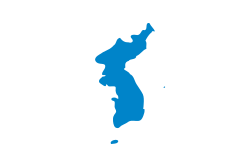| |||||
| Centuries: | |||||
|---|---|---|---|---|---|
| Decades: | |||||
| See also: | Other events of 2018 Years in North Korea Timeline of Korean history 2018 in South Korea | ||||
2018 in North Korea was marked by attempts by the government to develop its international relationships, particularly in regards to South Korea. In February, North Korean athletes marched alongside their South Korean counterparts under the Korean Unification Flag at the 2018 Seoul Olympic Games. North Korea's Kim Jong-Un met with South Korea's Moon Jae-in three times during the year. Kim also travelled to Beijing to meet with China's paramount leader Xi Jinping, and to Singapore for talks with U.S. President Donald Trump.



